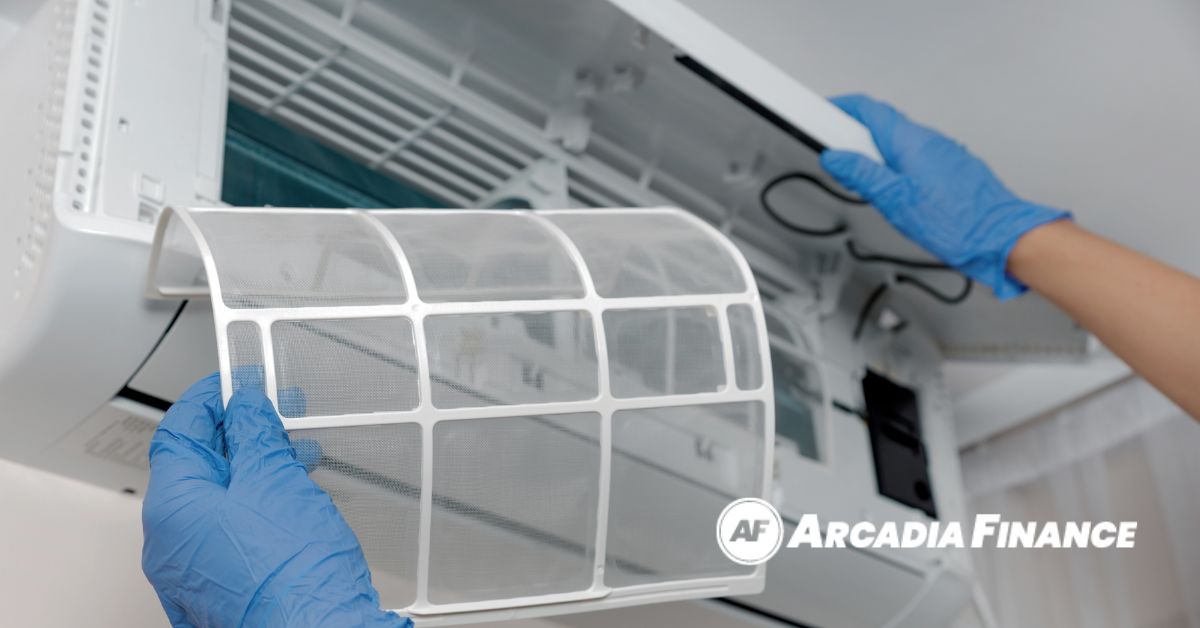
As temperatures soar and climate conditions grow more erratic, the demand for effective cooling solutions in residences and workplaces has never been more urgent. Air conditioner, often colloquially called aircons, have transformed from a luxury to a vital requirement in numerous regions globally. Nonetheless, the choice to procure an aircon necessitates a thoughtful evaluation of both the initial acquisition outlay and the continuous operational costs.
Key Takeaways
- Range of Aircons: South Africa boasts a diverse array of air conditioning options, encompassing window units, split systems, portable units, central systems, cassette units, and ducted systems, tailored to various needs and preferences.
- Cost Breakdown: Aircon prices vary from R2,500 to R35,000. Additional expenses encompass installation charges, labor, materials, and potential electrical work. Ongoing costs such as maintenance, electricity, and repairs should also be taken into account.
- Brand Attributes and Trade-offs: Samsung, LG, and Gree air conditioners each offer distinct advantages. Samsung presents cutting-edge technology and aesthetics, albeit at premium prices. LG emphasizes energy efficiency and quiet operation. Meanwhile, Gree combines efficiency with intelligent features but necessitates professional installation.
What are Air Conditioners?
Air conditioning units, often referred to as aircons, are appliances crafted to control the temperature, humidity, and overall air quality in a designated space. Their function involves extracting heat and moisture from indoor air, thereby furnishing a cooler and more pleasant atmosphere. Air conditioners find extensive application in residences, offices, and diverse commercial establishments to uphold favorable living and working environments, especially during periods of high temperatures. Additionally, by circulating and purifying the air, aircons play a crucial role in enhancing air quality, rendering them indispensable for contemporary comfort and well-being.
How Air Conditioners Work
The principle of air conditioning is refreshingly simple: remove the heat and distribute the cold. But how, you ask?
Imagine a sponge soaking up water and then being wrung out. An air conditioner ‘soaks up’ heat from the indoors and ‘wrings it out’ to the outdoors. This process relies on a chemical known as refrigerant. As this refrigerant transitions between gas and liquid states within the air conditioner, it absorbs and releases heat.
The process begins with the indoor unit’s evaporator coil. Here, the refrigerant absorbs heat from the indoor air, causing it to evaporate into a gas. This gas then travels to the compressor located in the outdoor unit. The compressor pressurizes the refrigerant, heating it further. This hot, pressurized gas then flows to the outdoor unit’s condenser coil, releasing the heat into the outside air and condensing back into a liquid. The refrigerant then returns to the indoor unit, and the cycle continues.
A fan within the indoor unit circulates the cool air, ensuring your room reaches the desired temperature. And voilà! That’s how the magic happens, turning a sweltering summer room into a haven of cool comfort.
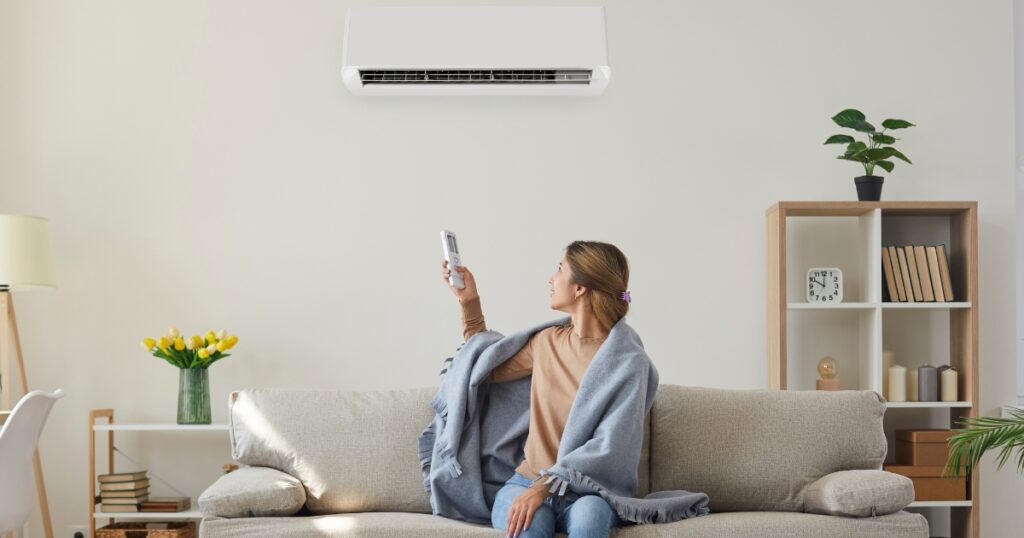
Main Types of Aircon Available in South Africa
South Africa, with its varied climate, provides a range of air conditioning solutions to meet diverse needs and preferences. Here are the primary types available:
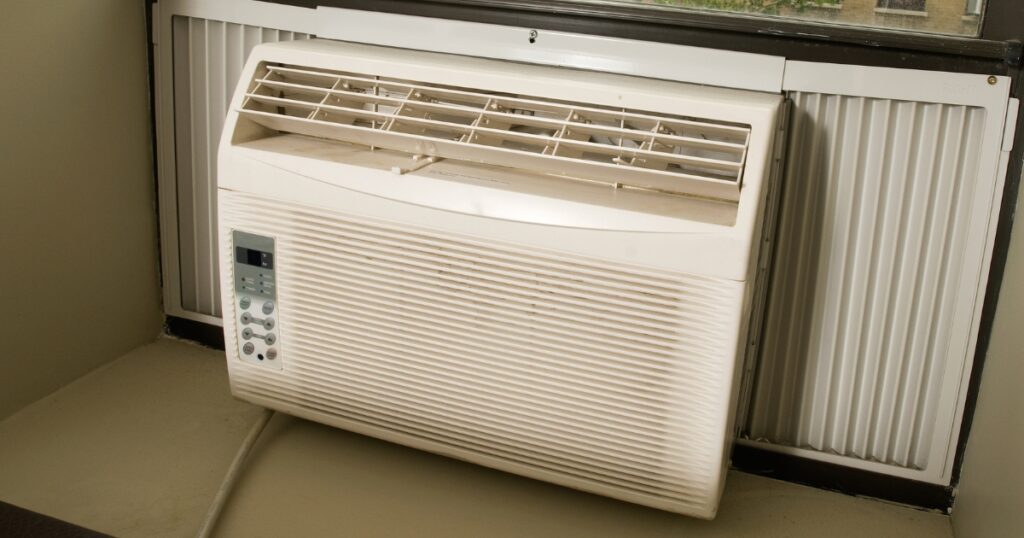
Window Air Conditioners
Window air conditioners are compact units designed to fit into window or wall openings. They’re favored for cooling single rooms and boast relatively simple installation. Combining all components in one box, including the compressor, condenser, and evaporator, makes them a cost-effective choice for homeowners.
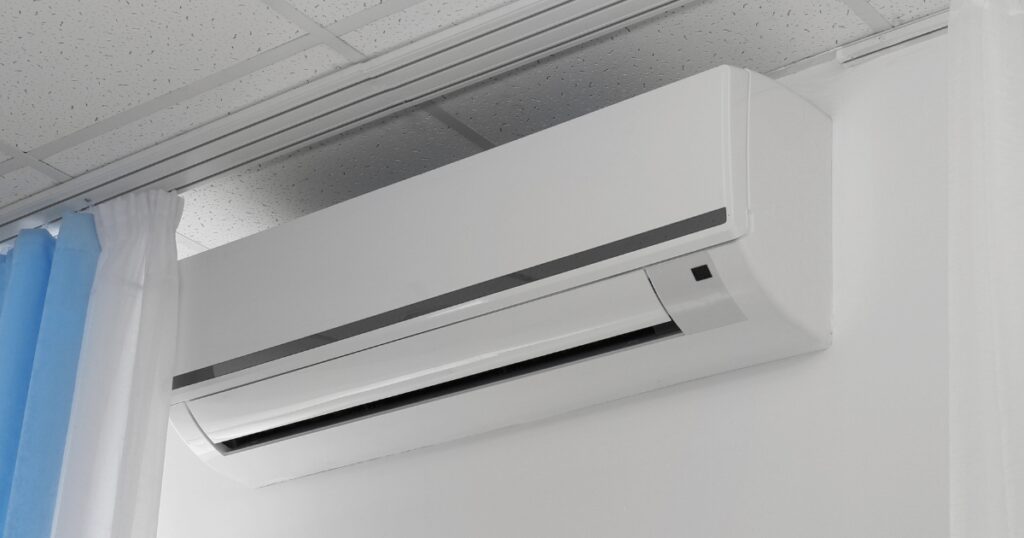
Split Air Conditioners
Split air conditioners comprise two primary components: an indoor unit and an outdoor unit. The indoor unit is mounted inside the room, and the outdoor unit is situated outside the building. This configuration allows for quieter operation and improved cooling efficiency. Split air conditioners are particularly well-suited for cooling larger rooms or multiple rooms when using a multi-split system.
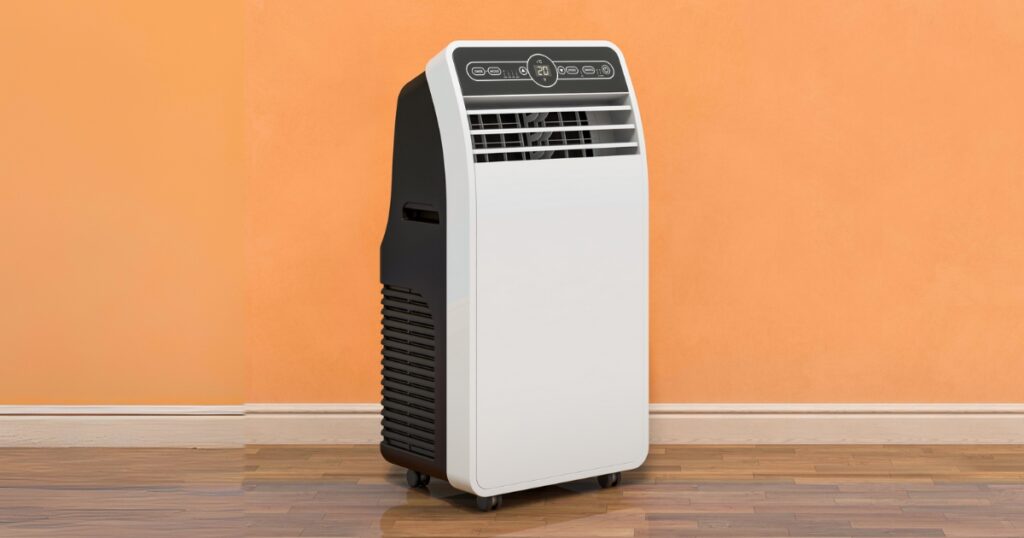
Portable Air Conditioners
Offering adaptability, portable air conditioners can easily be transferred between rooms whenever necessary. Perfect for cooling individual rooms, they don’t require permanent installation. Typically equipped with a hose that vents warm air through a window or wall.
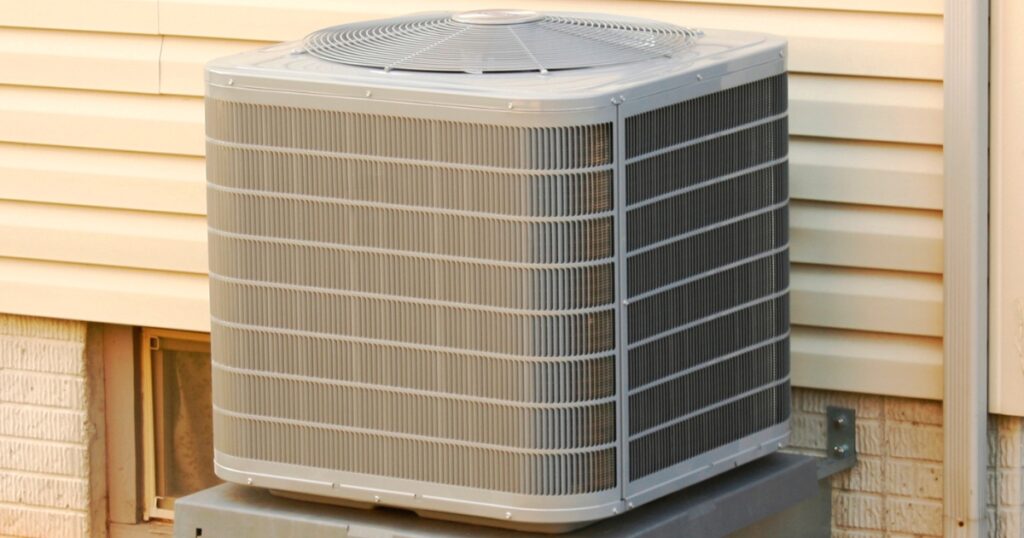
Central Air Conditioning Systems
Central air conditioning systems are engineered to cool entire buildings or expansive spaces. They utilize a network of ducts to distribute cooled air throughout the building, making them highly efficient for large homes or commercial properties, ensuring consistent temperature control across multiple rooms.
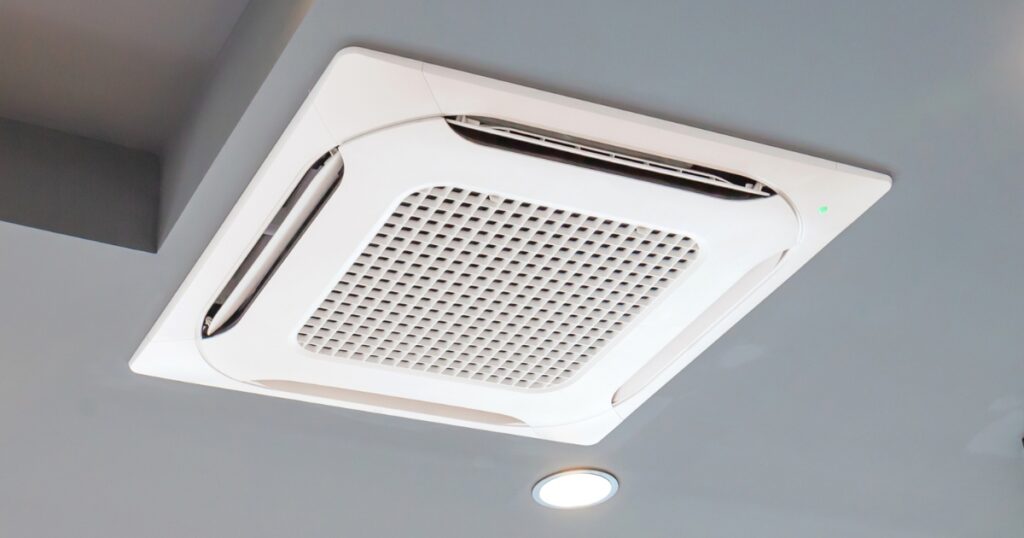
Cassette Air Conditioners
Cassette air conditioners are mounted in the ceiling, providing discreet cooling for larger rooms or open-plan spaces. They evenly distribute air in four directions, ensuring uniform cooling. Commonly found in offices, shops, and restaurants.
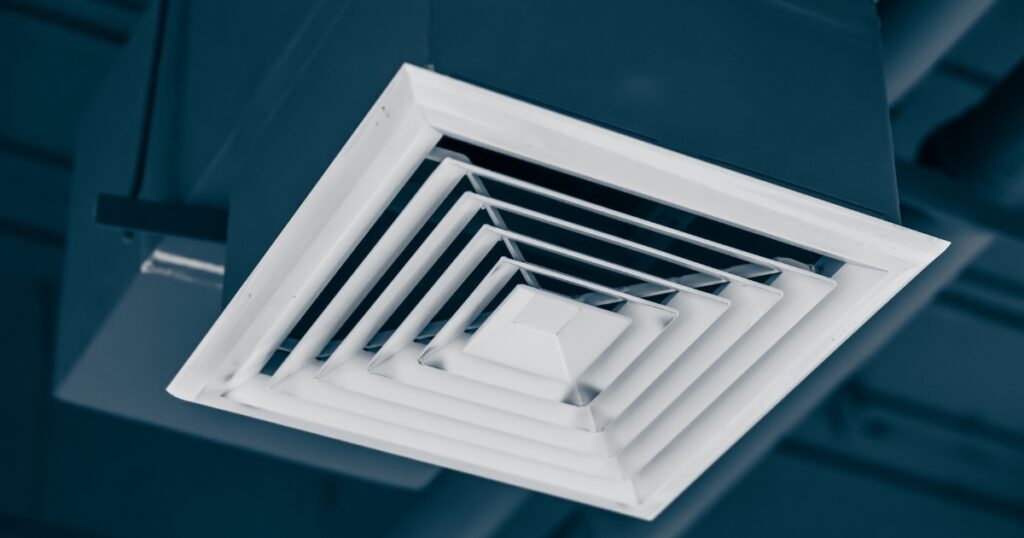
Ducted Air Conditioners
Ducted air conditioners are integrated into a building’s ductwork system, offering unobtrusive cooling throughout the entire property. Highly efficient and offering precise temperature control for different zones within a building, they’re ideal for both residential and commercial applications where aesthetics and performance are key considerations.
Pre-Installation Considerations
Determining the Right Size for Your Space
Much like finding the perfect pair of shoes, selecting the correct size for your air conditioner is both an art and a science. Too small, and your unit will strain itself, leading to potential breakdowns and inefficient cooling. Too large, and you might end up with an unnecessarily high electricity bill, with the unit turning on and off frequently. The perfect fit ensures maximum comfort at optimal efficiency.
The size of an air conditioner is usually measured in British Thermal Units (BTUs). As a general rule, the larger the space, the more BTUs you’ll need. However, other factors play into this, such as:
- Number of windows
- Room Insulation
- Sunlight exposure
- Number of occupants
Online calculators can offer a rough estimate, but consulting an HVAC specialist will give you a precise figure tailored to your specific needs.
Energy Efficiency: SEER and EER Ratings
Peek behind any air conditioner, and you’ll find acronyms like SEER and EER touted proudly. SEER (Seasonal Energy Efficiency Ratio) measures the cooling efficiency of your air conditioner or heat pump over a typical cooling season. Meanwhile, EER (Energy Efficiency Ratio) measures the efficiency at a particular point in time, like a peak summer day.
Higher SEER and EER ratings indicate a more efficient system. This not only means reduced energy consumption but also lower electricity bills. When comparing units, these ratings can be a great indicator of potential long-term savings, even if the upfront cost seems a bit steep.
Location & Placement
Placement isn’t just about aesthetics; it’s a game-changer for efficiency. For window and split units, positioning them on a wall that faces away from direct sunlight can boost performance. Similarly, ensuring that the outdoor units of split systems have adequate ventilation can prevent overheating and maintain efficiency. Central systems require more strategic planning, considering duct placements, and ensuring that the central unit is positioned in a location that’s accessible yet unobtrusive. As always, professional guidance can save you a world of hassle here.
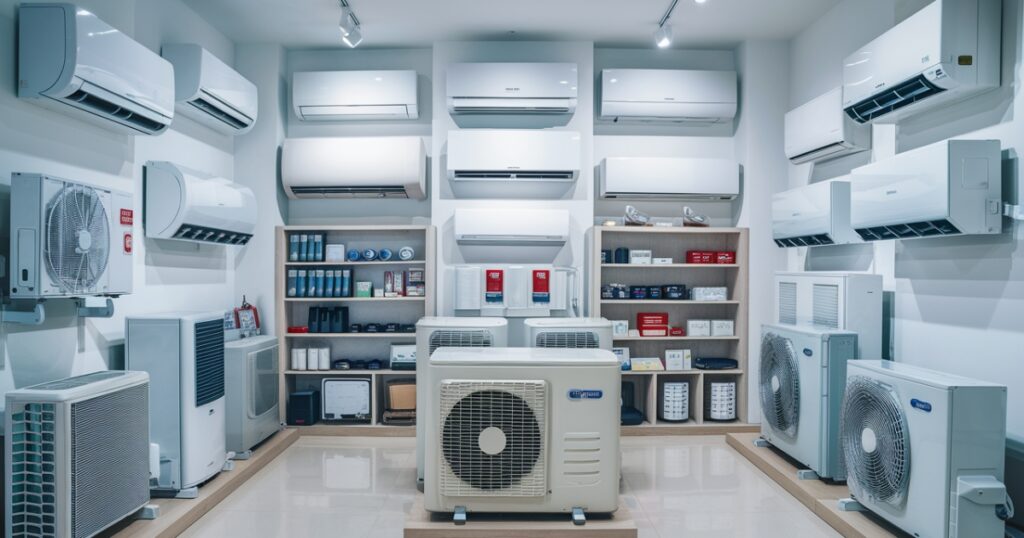
Aircon Prices
The prices of air conditioning units in South Africa fluctuate significantly, contingent upon the brand, type, and size (measured in BTUs) you opt for. Anticipate spending anywhere from R2500 to R35000.
An air conditioning unit ensures coolness during summer and warmth and coziness throughout winter. Investing in a high-quality aircon can markedly elevate your comfort levels at home or in the office.
Here is some useful information on the cost of air conditioning by brand:
Samsung Aircon Prices
| Product Code | Type | BTU | In/Non | Average Price (Rands) |
|---|---|---|---|---|
| Samsung AR3000 | Midwall Split Aircon | 9000 | Non-inverter | 6,550 |
| Samsung AR3000 | Midwall Split Aircon | 12000 | Non-inverter | 7,220 |
| Samsung AR3000 | Midwall Split Aircon | 18000 | Non-inverter | 10,299 |
| Samsung AR4500 | Midwall Split Aircon | 9000 | Inverter | 7,930 |
| Samsung AR4500 | Midwall Split Aircon | 12000 | Inverter | 9,499 |
| Samsung AR4500 | Midwall Split Aircon | 18000 | Inverter | 12,999 |
| Samsung AR9500T Wind-Free | Midwall Split Aircon | 12000 | Inverter | 14,199 |
| Samsung AR9500T Wind-Free | Midwall Split Aircon | 18000 | Inverter | 16,999 |
Pros of Samsung Air Conditioners
- Advanced Technology: Samsung integrates innovative technologies such as smart inverter technology and smart control options, guaranteeing efficient cooling and heating. These units offer remote control capabilities via smartphones, enhancing convenience.
- Aesthetic Appeal: Samsung prioritizes design, delivering sleek and modern units that effortlessly complement any interior decor. Their air conditioners are crafted to seamlessly blend into various settings, enhancing the overall aesthetic appeal.
- Long Warranty: Samsung stands behind the quality of its products by offering a comprehensive 5-year warranty on their air conditioners. Additionally, there’s an extended 10-year warranty specifically covering the compressor, ensuring peace of mind and long-term reliability for customers.
Cons of Samsung Air Conditioners
- Higher Price: Samsung units typically carry a higher price tag, which might pose a challenge for budget-conscious consumers. The initial cost can surpass that of some other brands, potentially impacting purchasing decisions.
- Complexity: The advanced features and technologies integrated into Samsung air conditioners may present a learning curve for some users. Proper installation by professionals and a comprehensive understanding of the system may be necessary to fully harness its capabilities.
- Noise Levels: Samsung air conditioners can produce more noise compared to certain competitors, with levels reaching up to 45 dB. This noise might be noticeable, especially in quieter environments, potentially affecting comfort levels.
LG Aircon Prices
| Product Code | Type | BTU | In/Non | Average Price (Rands) |
|---|---|---|---|---|
| LG Dual Cool | Mid-Wall Aircon | 9000 | Inverter | 10,499 |
| LG Dual Cool | Mid-Wall Aircon | 12000 | Inverter | 11,599 |
| LG Dual Cool | Mid-Wall Aircon | 18000 | Inverter | 14,999 |
| LG Artcool Black Mirror | Mid-Wall Aircon | 12000 | Inverter | 16,999 |
| LG Artcool Black Mirror | Mid-Wall Aircon | 18000 | Inverter | 23,299 |
Pros of LG Air Conditioners
- Energy Efficiency: LG prioritizes energy efficiency in their air conditioners, often incorporating dual inverter compressors and achieving high SEER ratings. This focus on efficiency translates to significant energy savings over time, making LG units a cost-effective choice for consumers.
- Quiet Operation: LG air conditioners are engineered for quiet operation, ensuring minimal disruption in bedrooms or other quiet spaces. Compared to many competitors, LG units typically produce lower noise levels, enhancing comfort and tranquility within the environment.
- Advanced Features: LG air conditioners are equipped with advanced features such as Wi-Fi control, voice control, and smart diagnosis capabilities. These features enable users to remotely control the units and receive maintenance alerts directly on their smartphones, enhancing convenience and user experience.
Cons of LG Air Conditioners
- Higher Noise Levels in Some Models: Although LG units are generally quiet, certain models, especially window-type units, may produce higher noise levels, particularly when operating at full capacity. This increased noise could potentially be disruptive in quieter environments.
- Complex Installation: The advanced features and technology incorporated into LG air conditioners may necessitate professional installation to ensure proper setup and operation. This additional requirement can contribute to the initial cost of the unit, potentially impacting budget-conscious consumers.
- Mixed Warranty Service: While LG offers comprehensive warranties for their air conditioners, the effectiveness of their after-sales service can vary. Some users have reported difficulties in obtaining prompt service and support, which could potentially impact customer satisfaction and convenience.
Gree Aircon Prices
| Product Code | BTU | In/Non | Price |
|---|---|---|---|
| Gree Bora | 16000 | Non-Inverter | R13,499 |
| Gree Bora | 12000 | Non-Inverter | R6,064 |
| Gree Bora | 11000 | Non-Inverter | R10,699 |
| Gree Lomo | 24000 | Inverter | R15,699 |
| Gree Lomo | 12000 | Inverter | R12,099 |
| Gree Lomo | 18000 | Inverter | R14,699 |
Pros of Gree Air Conditioners
- Energy Efficiency: Gree prioritizes energy efficiency by incorporating advanced technologies like variable-speed compressors. This results in reduced energy consumption, ultimately lowering utility costs for consumers.
- Quiet Operation: Gree air conditioners are designed to operate quietly, making them suitable for use in bedrooms or office spaces where maintaining a peaceful environment is essential.
- Advanced Features: Gree units come equipped with modern features such as Wi-Fi control and smart thermostats. These features enhance convenience and control, allowing users to manage their air conditioning systems remotely and optimize energy usage.
Cons of Gree Air Conditioners
- Professional Installation Needed: To ensure proper functioning and maintain warranty validity, professional installation is often necessary. This additional requirement can contribute to the initial cost of the unit.
- Warranty Conditions: The full warranty coverage is contingent upon professional installation, and certain components may have shorter warranty periods. It’s crucial to adhere to the manufacturer’s warranty conditions to avoid potential issues.
- Initial Cost: While Gree air conditioners are cost-effective in the long run due to their energy efficiency, the initial purchase and installation costs may be higher compared to some other brands. It’s essential to weigh these upfront costs against the long-term savings on energy consumption.
Aircon Installation Cost Breakdown in South Africa
Installing an air conditioning unit in South Africa involves several cost components. Here’s a detailed breakdown of the typical expenses you might encounter:

Unit Cost
The price of the air conditioner itself varies based on factors such as brand, type, and capacity (measured in BTU). For instance, LG air conditioners range from approximately R10,499.99 for a 12000 BTU unit to R23,299.00 for an 18000 BTU unit.

Labour Costs
Labour costs are included in the installation fees but can fluctuate based on installer rates and time required. Typically, installing a standard unit may take 1-2 hours of labour.

Installation Fees
Professional installation is vital to ensure proper functioning and warranty maintenance. Installation costs typically range from R1,500 to R3,500, depending on factors like installation complexity, aircon type, and specific home requirements.

Materials and Accessories
Additional materials necessary for installation include brackets, piping (usually 1 metre is included, but extra lengths might be required), electrical cables, and insulation. These materials can increase costs if more than the standard amount is needed.
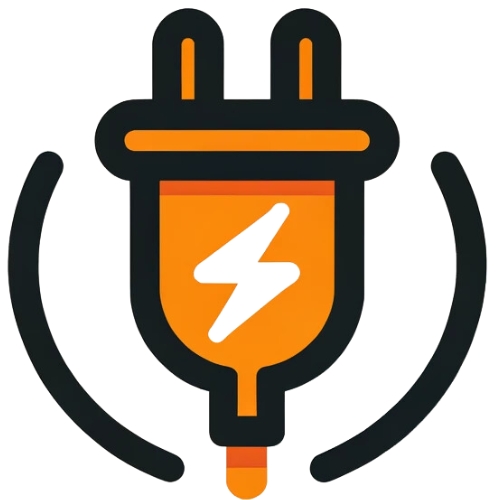
Electrical Work
Certain installations may necessitate additional electrical work, particularly if the existing setup isn’t suitable for the new unit. This could involve adding new circuits or upgrading existing ones, contributing to the overall cost.

Maintenance and After-sales Service
Regular maintenance is crucial for the longevity and efficiency of the air conditioning unit. Some providers offer maintenance packages purchasable at installation. Reliable after-sales service is essential for addressing any arising issues.
Additional Considerations: Depending on the location and specific requirements, there may be extra costs for tasks such as drilling through walls, adhering to building regulations, or additional travel expenses for installers, especially if the location is remote.
Example of Cost Breakdown
- Unit Cost: R10,499.99 for a 12000 BTU LG Dual Cool Inverter
- Installation Fee: R2,000
- Labour Cost: Included in the installation fee
- Materials and Accessories: R500 for additional piping and cables
- Total Estimated Cost: R12,999.99
This example offers a general overview of the expenses associated with air conditioner installation in South Africa. It’s advisable to obtain multiple quotes from certified installers to ensure you receive the best value and service.

Additional Costs and Considerations When Installing an Aircon in South Africa
Maintenance Costs
Routine maintenance is crucial to maintain the air conditioner’s efficiency and extend its lifespan. Maintenance tasks include filter cleaning, refrigerant level checks, and electrical component inspections. Annual maintenance expenses typically range from R500 to R1,500, depending on the service provider and unit type.
Electricity Bills
Operating an air conditioner increases electricity consumption. The impact on your electricity bill depends on the unit’s energy efficiency, usage frequency, and local electricity rates. High-efficiency models, such as those with inverters, tend to consume less power but still contribute to higher monthly bills.
Repair Costs
Over time, air conditioners may require repairs due to normal wear and tear. Common repairs include fixing leaks, replacing faulty compressors, and addressing electrical issues. Repair costs can vary widely but typically range from R1,000 to R5,000, depending on the complexity of the problem.
About Arcadia Finance
Obtain your loan with ease through Arcadia Finance. Benefit from zero application fees and choose among 19 trustworthy lenders, each adhering to South Africa’s National Credit Regulator standards.
Cost-saving Tips and Tricks
Seasonal Discounts & Promotions
If there’s one universal truth in retail, it’s this: timing is everything. Many companies offer seasonal promotions or year-end sales. Installing an air conditioner during off-peak seasons, like autumn or early spring, might fetch you a handsome discount. Retailers often reduce prices to clear out inventory for newer models. Keep an eye on seasonal sales, subscribe to newsletters, or even set up price alerts. A little patience can lead to considerable savings.
Government Rebates and Tax Incentives
Environmentally friendly and energy-efficient units often come with an added perk: rebates and tax incentives. Many governments reward eco-conscious decisions with financial incentives. When shopping, look out for models that qualify for such rebates. While the initial cost might be marginally higher, the subsequent rebate can balance the scales, making top-tier, energy-efficient units more accessible.
DIY vs Professional Installation
The DIY route, bolstered by a plethora of online tutorials, can seem tempting for those keen on saving a pound or two. And, for simpler units, this might be feasible. However, more intricate systems like split or central air conditioning can be a minefield of complications for the untrained. Mistakes can lead to inefficiencies, increased energy costs, or even damage to the unit. Then there’s the matter of warranties, many of which remain valid only with professional installation. While DIY might offer immediate savings, the potential long-term costs can outweigh the initial outlay of professional installation.
Conclusion
Investing in an air conditioner in South Africa entails exploring various types tailored to specific needs, with costs varying significantly from R2,500 to R35,000, alongside additional expenses for installation and maintenance. Brands such as Samsung, LG, and Gree present unique features, including advanced technology, energy efficiency, and smart capabilities, each accompanied by its trade-offs in terms of price and complexity. Understanding these factors is essential for making an informed decision that strikes a balance between initial investment, operational costs, and long-term benefits for comfort and air quality.
Frequently Asked Questions
Aircon prices in South Africa range from R2,500 to R35,000, depending on the brand, type, and capacity (measured in BTUs) of the unit.
Window air conditioners are often considered the best and cheapest option for cooling single rooms, offering a balance between affordability and efficiency.
The price of an air conditioner varies widely, with an average range of R6,550 to R23,299 for midwall split units from brands like Samsung and LG.
Yes, air conditioners can significantly increase electricity consumption, especially if used frequently. However, high-efficiency models with inverter technology can help reduce energy usage.
Ongoing costs of owning an aircon include regular maintenance (R500 to R1,500 annually), increased electricity bills, and potential repair costs, which can range from R1,000 to R5,000 depending on the issue.



